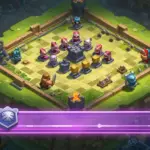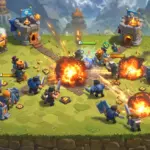Clash Royale Tournament Domination: Win 75% More Battles
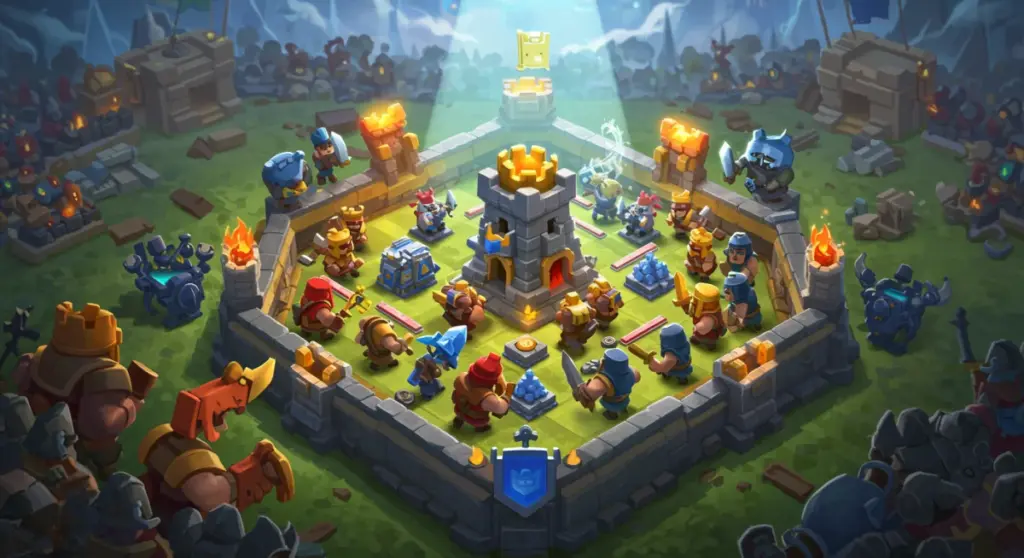
Anúncios
Achieving consistent Clash Royale tournament domination requires a deep understanding of meta-game shifts, precise elixir management, and adaptive counter-play, enabling players to secure significantly higher win rates.
Are you tired of falling short in Clash Royale tournaments? Do you want to elevate your gameplay and consistently outperform your opponents? Unlocking Clash Royale tournament domination: insider strategies to win 75% more battles is not just a dream; it’s an achievable goal with the right mindset, preparation, and execution. This guide will arm you with the knowledge and tactics to transform your tournament performance, turning near misses into decisive victories.
Understanding the Tournament Meta and Deck Building
The foundation of any successful Clash Royale tournament run lies in a profound understanding of the current meta-game. The meta, or most effective tactics available, constantly evolves, influenced by balance changes, new card releases, and community innovation. Staying ahead of this curve is paramount for crafting a winning deck that can adapt to various opponent strategies.
Effective deck building for tournaments is not about copying the top player’s deck blindly. It’s about understanding why certain cards synergize, how they counter prevalent archetypes, and what their weaknesses are. A truly dominant deck is one that you understand intimately, capable of performing well against a broad spectrum of opponents while maximizing your personal playstyle.
Analyzing Current Meta Trends
Before stepping into a tournament, dedicate time to research. Watch top-tier players, analyze recent tournament results, and pay attention to community discussions. Identify which cards are overperforming, which archetypes are dominant (e.g., Golem beatdown, Log Bait, Cycle decks), and which niche strategies are gaining traction. This reconnaissance is your first step towards informed deck selection.
- Identify dominant archetypes and their core cards.
- Note common counter-strategies and defensive placements.
- Observe elixir trade patterns and win conditions.
Building a Versatile Tournament Deck
A versatile deck is one that has answers for multiple threats without being overly specialized. It should include a clear win condition, reliable defensive cards, a spell or two for support and damage, and inexpensive cycle cards. Balance is key; avoid decks that are too heavy on elixir or too fragile defensively.
Consider including cards that offer multiple roles, such as the Electro Wizard for stun and splash, or the Bandit for offense and defense. These multi-purpose cards provide flexibility and can often create positive elixir trades, a critical component of tournament success.
Ultimately, understanding the meta and building a versatile deck is the groundwork. Without this solid foundation, even the best in-game tactics will fall short. It’s about preparation meeting opportunity, ensuring your chosen cards give you the best possible chance to adapt and overcome whatever your opponent throws at you.
Mastering Elixir Management and Cycle Control
Elixir management is arguably the most crucial skill in Clash Royale, especially in tournaments where every drop counts. It’s the art of spending your elixir efficiently, creating positive elixir trades, and dictating the pace of the game through careful card cycling. A player who consistently maintains an elixir advantage will inevitably overwhelm their opponent.
Cycle control goes hand-in-hand with elixir management. Understanding your deck’s cycle and anticipating your opponent’s allows you to strategically deploy cards to gain an advantage. This might involve holding onto a specific counter card until the opportune moment or cycling quickly to get back to your win condition.
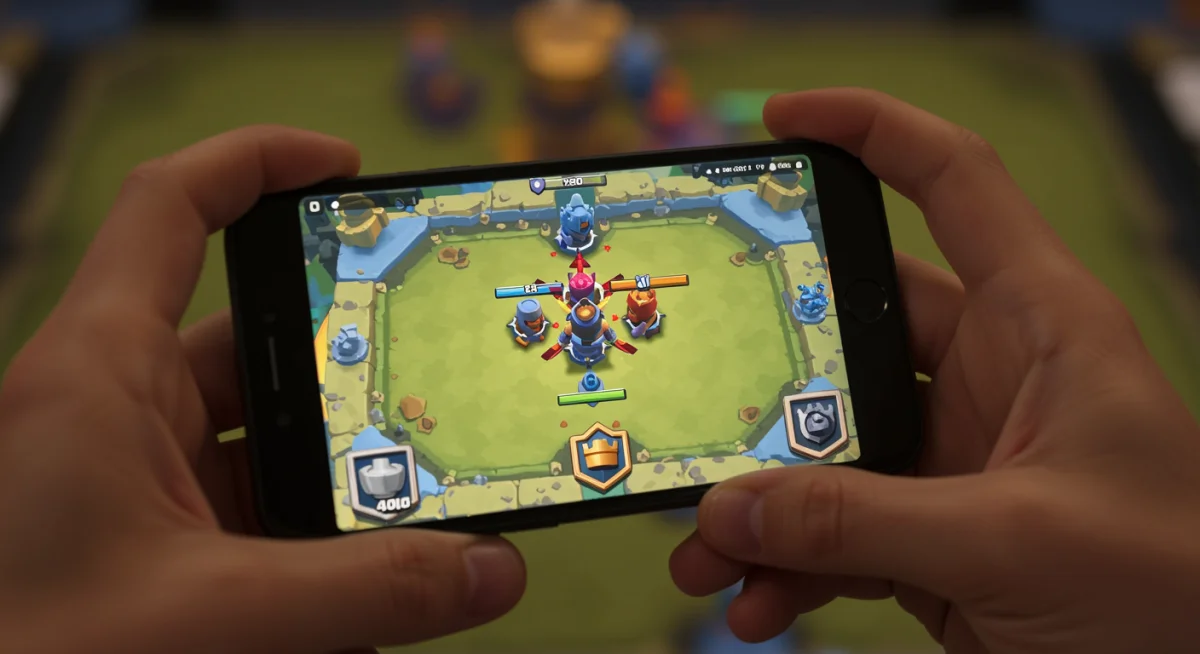
Maximizing Positive Elixir Trades
A positive elixir trade occurs when you use less elixir to counter an opponent’s push than they spent on it. For example, using a 3-elixir Knight to fully defend against a 5-elixir Hog Rider grants you a 2-elixir advantage. These small advantages accumulate over the course of a match, allowing you to build larger, more threatening pushes that your opponent cannot defend.
Learn the elixir costs of all cards and practice common interactions. Knowing which cards can fully counter others for less elixir is fundamental. This knowledge allows for instinctive, efficient defense, paving the way for powerful counter-attacks.
- Memorize elixir costs and effective counter interactions.
- Prioritize defending with minimal elixir.
- Look for opportunities to get value from splash damage or multi-target cards.
Strategic Card Cycling
Your deck’s cycle refers to the order in which your cards appear. Controlling this cycle means understanding when to play inexpensive cards to get back to a key defensive or offensive card more quickly. If your win condition is in your hand but you can’t play it effectively yet, cycling a cheap card like Skeletons or Ice Spirit can accelerate its return.
Furthermore, observing your opponent’s cycle is vital. If you know they just played their main counter to your win condition, you can pressure the other lane, forcing them to use other cards and giving you time to cycle back to your win condition for a decisive push.
Effective elixir management and cycle control transform reactive gameplay into proactive strategy. By consistently out-cycling and out-valuing your opponent, you create a snowball effect that leads to overwhelming pressure and, ultimately, victory.
Aggressive vs. Defensive Playstyles: Knowing When to Switch
One of the hallmarks of a truly dominant Clash Royale player is the ability to seamlessly transition between aggressive and defensive playstyles. Sticking to a single approach, regardless of the situation, makes you predictable and easily counterable. Understanding when to apply pressure and when to conserve elixir for defense is a crucial aspect of tournament success.
This adaptability is not innate; it’s developed through extensive practice, keen observation, and a willingness to adjust your strategy on the fly. Reading your opponent’s tendencies and adjusting your own tempo accordingly can often be the difference between a win and a loss.
Identifying Opponent’s Intentions
Pay close attention to your opponent’s opening moves. Do they start with a heavy tank in the back? Are they cycling cheap cards? Are they trying to bait out your specific counters? These early indicators provide valuable insight into their preferred playstyle and win condition. Use this information to formulate your initial response.
If your opponent is playing passively, you might have an opportunity to build up a slow, powerful push. If they are aggressive from the start, prioritize defense and look for opportunities to punish their overextension with a well-timed counter-push.
Transitioning Between Offense and Defense
The key to effective transitioning is often tied to elixir advantage and card rotation. If you’ve just made a positive elixir trade on defense, that’s your cue to potentially launch a counter-attack. The remaining defensive troops can often form the spearhead of a new offensive push, forcing your opponent to react.
Conversely, if you’re behind on elixir or your opponent is building a massive push, it’s time to shift gears to a purely defensive stance. Focus on minimizing damage, getting positive elixir trades, and cycling to your best defensive cards. Sometimes, a well-timed spell on defense can completely neutralize a push and allow you to regain control.
Being fluid in your playstyle, never committing to one extreme, allows you to dictate the flow of the game. This constant adaptation keeps your opponent guessing and prevents them from establishing a comfortable rhythm, a critical component of achieving tournament domination.
Advanced Card Placement and Timing
Beyond simply knowing what cards to play, mastering where and when to play them is what separates good players from great ones. Advanced card placement and timing can significantly amplify the effectiveness of your troops and spells, turning seemingly even exchanges into decisive advantages. Understanding troop pathing, engagement mechanics, and spell radius is paramount.
This involves a deep understanding of each card’s unique interactions and how they behave on the arena. A single tile difference in placement can determine whether a troop targets a tower or a tank, or if a spell hits all intended targets.
Optimizing Troop Placement
Troop placement is not just about putting a card down; it’s about influencing troop movement and engagement. For example, placing a building like Inferno Tower in the middle can pull both lanes of attacking troops, centralizing their threat. Placing melee troops slightly off-center can kite enemy troops, drawing them away from your tower while your ranged units pick them off.
- Use buildings to pull and distract targeting troops.
- Place splash damage units to maximize hits on grouped enemies.
- Utilize kiting techniques to draw enemy troops away from your towers.
Precision Spell Timing
Spells are powerful tools that can clear swarms, finish off towers, or reset dangerous troops. However, their effectiveness is heavily dependent on precise timing. Using a Fireball too early on a push might miss key units, while using it too late might allow those units to deal significant damage. Anticipating troop movements and understanding deployment delays are crucial.
Consider the ‘value’ of a spell. A well-timed Earthquake on an X-Bow and an attacking tank provides immense value, neutralizing a major threat for a positive elixir trade. Conversely, using a Rocket on a single Musketeer is often an overcommitment unless it’s for a game-ending tower snipe.
The nuances of card placement and timing are often learned through repetition and analysis of replays. Every mistake is a learning opportunity to refine your micro-play, leading to more efficient defenses and more devastating attacks.
Psychological Warfare and Opponent Analysis
Clash Royale tournaments are not just about cards and elixir; they’re also a battle of wits. Engaging in psychological warfare and effectively analyzing your opponent’s tendencies can give you an invaluable edge. This involves more than just reacting to their plays; it’s about anticipating, baiting, and exploiting their mental and strategic weaknesses.
Understanding the human element behind the screen allows you to manipulate the game state in your favor. This can range from subtle changes in your playstyle to overt baiting tactics designed to provoke a specific response.
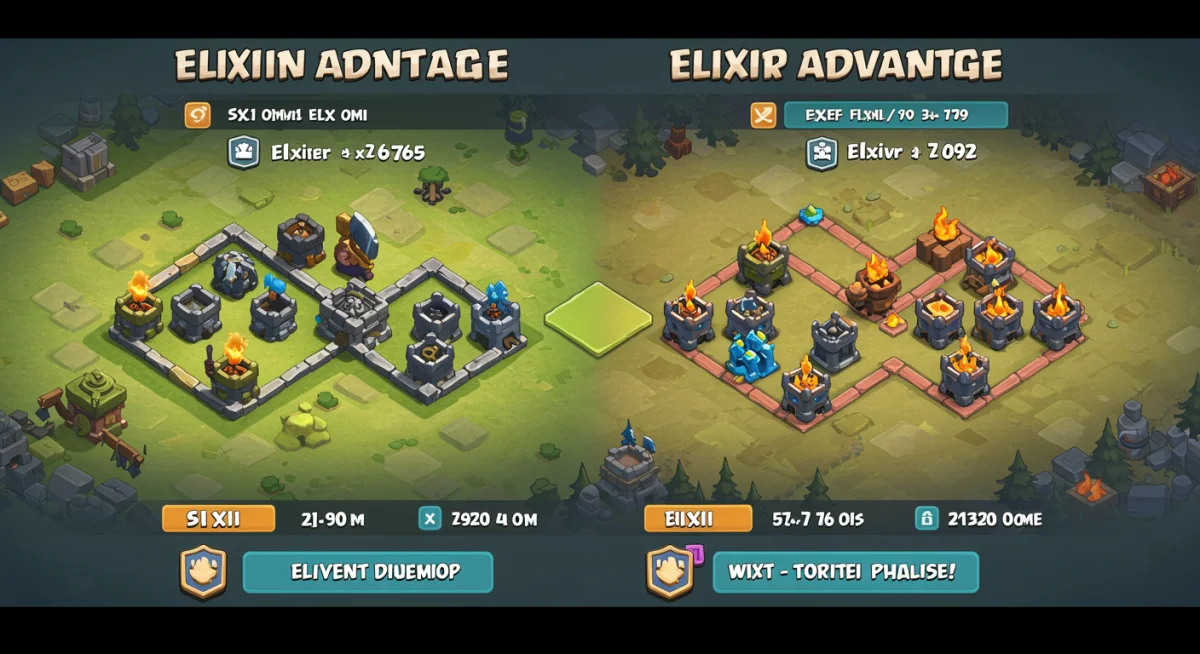
Reading Your Opponent’s Hand and Cycle
As the match progresses, try to deduce what cards are in your opponent’s hand and what their cycle looks like. If they just played their Golem, you know they won’t have it for a while. If they haven’t played their main spell yet, anticipate its arrival. This predictive ability allows you to plan your pushes and defenses more effectively, avoiding costly mistakes.
Look for patterns in their deployment. Do they always place their Electro Wizard in the same spot? Do they overcommit on defense? Identifying these habits allows you to exploit them. For instance, if they always defend one lane aggressively, you can punish them with a strong push on the other.
- Track opponent’s card rotation and elixir usage.
- Identify predictable deployment patterns.
- Anticipate their next move based on their current hand.
Baiting and Punishing
Baiting involves playing a card or making a small push that forces your opponent to use a specific counter card, ideally one that is crucial for defending your actual win condition. For example, if you have Hog Rider as your win condition and your opponent’s main counter is Mini P.E.K.K.A., you might play a Goblin Barrel to bait out their Mini P.E.K.K.A. Once it’s used, you can then unleash your Hog Rider with less fear of a direct counter.
Punishing refers to immediately capitalizing on an opponent’s overcommitment or misplay. If they spend too much elixir on a push that you easily defend, swiftly launch a counter-attack before they can cycle back to their defensive cards. This aggressive response can often lead to easy tower damage or even a tower take-down.
Psychological warfare is about playing chess, not checkers. It’s about thinking several moves ahead, understanding your opponent’s likely reactions, and setting traps that lead to your ultimate victory. This mental game is a powerful tool for achieving tournament domination.
Practice, Replay Analysis, and Community Engagement
Even with the best strategies, consistent tournament domination doesn’t happen overnight. It requires dedication to continuous improvement, which comes primarily through rigorous practice, meticulous replay analysis, and active engagement with the Clash Royale community. These three pillars form a virtuous cycle of learning and refinement that is indispensable for any aspiring champion.
Simply playing more games isn’t enough; it’s about playing with purpose and learning from every interaction, both victorious and defeat-ridden. The insights gained from analyzing your own gameplay and discussing strategies with others are invaluable.
Deliberate Practice and Ladder Grinding
Practice isn’t just about playing random battles; it’s about deliberate practice. Focus on specific aspects of your gameplay in each session. For instance, dedicate a few games solely to improving your elixir management, or focus on perfecting your defensive placements against a particular archetype. Ladder grinding, while different from tournament play, helps you refine mechanics and test deck variations against a wide range of opponents.
Don’t be afraid to experiment with new decks or card combinations. Sometimes, an unconventional approach can catch opponents off guard. The goal of practice is to expand your comfort zone and increase your adaptability.
- Set specific goals for each practice session.
- Experiment with different decks and strategies.
- Challenge yourself against diverse opponents.
In-Depth Replay Analysis
Your own replays are an untapped goldmine of information. After every tournament match, especially losses, watch your replay carefully. Don’t just watch it; analyze it. Ask yourself:
- Where did I make elixir negative trades?
- Could I have defended more efficiently?
- Did I miss an opportunity to punish my opponent?
- What was my opponent’s win condition, and how did I fail to counter it?
- Were there any misplacements or poorly timed spells?
Analyzing both your wins and losses with a critical eye helps you identify patterns in your play, correct recurring mistakes, and reinforce effective strategies. This self-critique is crucial for developing a deeper understanding of the game.
Engaging with the Clash Royale Community
The Clash Royale community is a vast resource for learning and growth. Join Discord servers, follow top players and content creators, participate in forum discussions, and watch live streams. These platforms offer opportunities to learn about meta shifts, discover new deck ideas, and get feedback on your own gameplay.
Don’t be afraid to ask for advice or share your own insights. Collaborative learning can accelerate your progress significantly. The collective wisdom of the community often uncovers strategies and nuances that individual players might overlook.
By consistently engaging in deliberate practice, thorough replay analysis, and active community participation, you create a powerful feedback loop that will continuously improve your skills and lead you closer to achieving consistent tournament domination.
Adapting to Tournament-Specific Rules and Formats
Tournament play in Clash Royale often comes with specific rules and formats that differ from standard ladder matches. These variations can significantly impact optimal strategy and deck choice. True tournament domination requires not just general skill, but also the ability to quickly understand and adapt to these unique constraints. Ignoring them can lead to unexpected losses, even for skilled players.
Different tournament formats, such as single-elimination, double-elimination, or swiss-style, introduce varying levels of pressure and strategic considerations. Similarly, special rules like ban phases or specific card level caps demand a tailored approach.
Understanding Card Level Caps and Bans
Most competitive tournaments feature card level caps (e.g., Level 9 for all cards). This standardization creates a level playing field, emphasizing skill over card levels. Your deck should be optimized for these caps, ensuring your cards are at the maximum allowed level if possible, and understanding how interactions change at these levels.
Some tournaments also include a ‘ban’ phase, where players can ban certain cards. This adds another layer of strategy, as banning a key card from your opponent’s preferred archetype can severely disrupt their game plan. Conversely, you must be prepared to play without one of your own core cards if it gets banned.
- Ensure your tournament decks are optimized for specified card level caps.
- Anticipate potential card bans and have alternative strategies ready.
- Understand how bans impact common meta archetypes.
Strategic Considerations for Different Formats
The tournament format itself dictates certain strategic choices. In a single-elimination bracket, every match is do-or-die, potentially leading to more cautious or ‘safe’ plays. In a double-elimination format, you have a chance to recover from a loss, which might encourage more aggressive or experimental strategies in earlier rounds.
For example, in a ‘best-of-three’ series, knowing your opponent’s deck from the first game allows for targeted counter-decking in subsequent games. This meta-game within the meta-game is crucial for multi-game formats. Always consider the long-term implications of your choices within the specific tournament structure.
By thoroughly understanding and strategically adapting to tournament-specific rules and formats, you eliminate potential blind spots and ensure that your refined skills are applied within the correct competitive context, paving the way for consistent success.
| Key Strategy | Brief Description |
|---|---|
| Meta Analysis & Deck Building | Continuously analyze current game trends and build versatile decks that counter prevalent archetypes while fitting your playstyle. |
| Elixir & Cycle Management | Master positive elixir trades and control card cycling to maintain an advantage and dictate game pace. |
| Adaptive Playstyle | Seamlessly switch between aggressive and defensive tactics based on opponent’s moves and game state. |
| Replay Analysis & Community | Learn from replays and engage with the community to continuously refine strategies and identify weaknesses. |
Frequently Asked Questions About Tournament Domination
While many factors contribute, consistent positive elixir trades combined with effective cycle management are arguably the most crucial. These skills allow you to build an unstoppable advantage over time, dictating the flow of the battle and overwhelming your opponent’s defenses.
The Clash Royale meta is constantly evolving. Significant shifts typically occur with balance changes, new card releases, and major tournament results. Staying updated requires continuous engagement with the community and analysis of top player strategies, often on a weekly or bi-weekly basis.
Not necessarily. While control decks are popular due to their defensive strength and ability to grind out wins, aggressive beatdown or fast cycle decks can also be highly effective. The best deck depends on the current meta, your personal playstyle, and your ability to master its mechanics.
Improvement comes through deliberate practice and replay analysis. Focus specifically on one card or interaction per session. Watch how top players place cards, and critically review your own replays to identify misplacements or missed opportunities for optimal timing and value.
Psychology is vital. Reading your opponent’s tendencies, baiting out their counters, and punishing their overcommitments are all forms of psychological warfare. Understanding how to manipulate the game state and anticipate your opponent’s next move provides a significant competitive edge.
Conclusion
Achieving significant success and Clash Royale tournament domination: insider strategies to win 75% more battles is a journey that combines strategic depth, mechanical skill, and continuous learning. By thoroughly understanding the evolving meta, mastering elixir and cycle management, adapting your playstyle, perfecting card placement and timing, and engaging in psychological warfare, you build a robust foundation for consistent victories. Remember, every battle is an opportunity to learn and refine your approach. Embrace deliberate practice, dissect your replays, and stay connected with the vibrant Clash Royale community. With dedication and the application of these insider strategies, you are well on your way to becoming a formidable force in any tournament, consistently outperforming your rivals and claiming your rightful place at the top.
